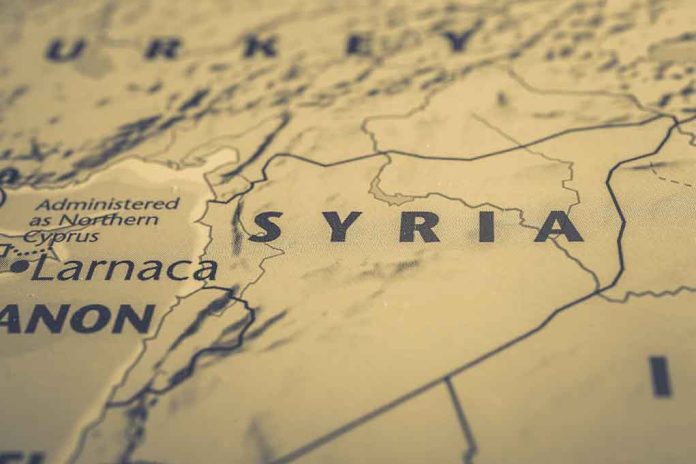
Israeli airstrikes in western Syria reportedly kill 16 people, escalating regional tensions and raising concerns about Middle Eastern stability.
At a Glance
- Israeli airstrikes on Syria’s Masyaf region killed at least 16 people and wounded 36 others
- The strikes targeted military facilities and were reported by Syrian state media
- Iran accused Israel of carrying out a “criminal” act in central Syria
- Israel has not commented on the strikes
- The attack is the deadliest Israeli strike reported by Syrian authorities since April
Deadly Airstrikes in Western Syria
In a significant escalation of regional tensions, Israeli airstrikes on Syria’s Masyaf region have resulted in at least 16 fatalities and 36 injuries. The attack, which targeted military facilities, was reported by Syrian state media and has drawn international attention. The strikes, occurring around 11:20 p.m. local time, mark the deadliest Israeli operation reported by Syrian authorities since April, underscoring the volatile nature of the ongoing conflict in the region.
Syrian air defenses reportedly intercepted some of the missiles, but the extent of their effectiveness remains unclear. The Syrian foreign ministry has strongly condemned the attack, characterizing it as blatant aggression and noting material damage to residential areas. This incident highlights the complex web of regional rivalries and the potential for further escalation in an already tense Middle Eastern landscape.
International Reactions and Accusations
The airstrikes have provoked strong reactions from various parties involved in the regional conflict. Iran, a key ally of Syria, accused Israel of carrying out a “criminal” act in central Syria. The Iranian foreign ministry spokesperson vehemently condemned the attack, while also denying claims that an Iranian center was targeted. These accusations underscore the intricate geopolitical dynamics at play in the region, where multiple actors vie for influence and strategic advantage.
Israel, consistent with its longstanding policy, has not commented on the strikes. However, the attack aligns with Israel’s history of targeting Iranian or Iran-backed assets in Syria, reflecting ongoing efforts to counter what it perceives as threats to its national security. This latest incident serves to further complicate diplomatic efforts aimed at stabilizing the region and raises questions about the potential for a wider conflict.
Disputed Claims and Potential Targets
Conflicting reports have emerged regarding the nature of the facilities targeted in the airstrikes. Two regional intelligence sources claimed that a major military research center for chemical arms production near Masyaf was among the targets hit. However, a senior regional military source refuted this claim, asserting that the facility in question was a Syrian research facility rather than a chemical weapons production site.
https://twitter.com/manniefabian?lang=en
These conflicting narratives highlight the challenges in obtaining accurate information in a conflict zone and underscore the importance of independent verification. The disputed claims also raise concerns about the potential proliferation of chemical weapons in the region, a issue of significant international concern given the history of chemical weapons use in the Syrian conflict.
Implications for Regional Stability
The latest airstrikes in western Syria serve as a stark reminder of the fragile nature of peace in the Middle East. With multiple actors involved, including regional powers and their proxies, the potential for further escalation remains high. The incident underscores the need for renewed diplomatic efforts to address the underlying tensions and conflicts that continue to plague the region.
As the international community grapples with the aftermath of this latest attack, questions arise about the effectiveness of current strategies to promote stability in the Middle East. The ongoing cycle of violence and retaliation threatens to undermine efforts at peaceful resolution and poses significant challenges for policymakers seeking to navigate the complex web of regional rivalries and alliances.










